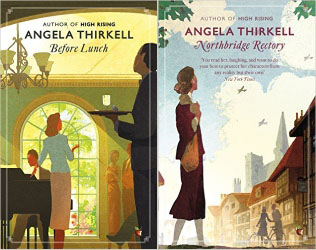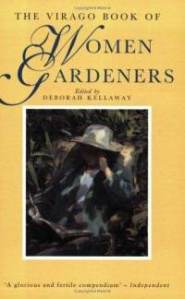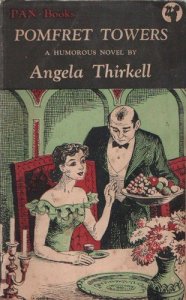 In this week of wartime diaries, These Wonderful Rumours!: A Young Schoolteachers’ Wartime Diaries by May Smith is certainly the most lighthearted of the books I’m discussing and one of my favourites. Here, the background anxieties of war are recorded and thoughtfully considered, but not at the expense of a young woman’s still active – and quite wonderfully-observed – social life.
In this week of wartime diaries, These Wonderful Rumours!: A Young Schoolteachers’ Wartime Diaries by May Smith is certainly the most lighthearted of the books I’m discussing and one of my favourites. Here, the background anxieties of war are recorded and thoughtfully considered, but not at the expense of a young woman’s still active – and quite wonderfully-observed – social life.
May was twenty-four years old when the war began, an elementary school teacher living with her parents in Derbyshire. A born diarist (in no small part influenced by the style of E.M. Delafield’s Provincial Lady), May recorded the events of her daily life with a spritely sense of humour. Unlike the tiresome Joan from earlier this week, May’s life was clearly impacted by the war. She follows what is going on and comments on events throughout the war. However, her main topics are the things that really absorbed her attention: the books she is reading (she has excellent and eclectic tastes), the films she has been to see, the clothes she is spending too much money on, the many unsatisfactory hats she seems to buy while in search of the perfect one, the tennis parties she goes to in the summers, and the many complaints she has about her life as a put-upon elementary school teacher.
Having one failed romance in her past (a clerical ex-fiancé whose comings and goings are scornfully remarked on for most of the book), she has two central admirers for most of the book: Fred and Dougie. Having flipped through the book earlier on and seen the photo of May and her husband in 1978, I knew from the start which man won but that did not impact my enjoyment of her offhanded treatment of them both. Dougie spends the war plying her with food to bulk up her rations while Fred squires her around to tennis parties and films. For years, neither makes much visible progress but their attempts at courtship (and May’s deft scheduling to make room for two suitors) provide May with the perfect comic material for her diaries. In the early years particularly, she doesn’t take either man’s attentions very seriously – all the better for us. Here is a typical example of her treatment of the Faithful Freddie:
Amy descended liked a locust upon us for tea, but left early to go to Wuthering Heights. She had just gone when, oh dear! – palpitations and heart-throbs – the Voice of My Beloved came floating over the telephone. No, it was only Dear Freddie, so my heart remained untouched. He invited me to the flicks, so having nothing to do, and making use of him, his pocket and his car again, I went. Saw a mediocre programme and promised to go to the dance with him next Wed. He smoked a pipe, but he puffed furiously at it as though he wanted to get it over quickly, so I’m sure he only did it to appear the Strong Silent Type and not because he really enjoyed it. His faults seem to strike me more readily than his virtues. I must be more forbearing. (Tuesday, December 5th, 1939)
Poor Fred also comes in for much criticism whenever he reveals a trait not to May’s liking – whether it be a liking for beer or comely WAAFs. Dougie rarely rouses as much passion, but then he was living in the Fens most of the time and was not close enough at hand to advertise his flaws as Fred did. Dougie, unlike most of May’s mild-mannered friends, was quite bloodthirsty when it came to the war. In his letters to May he spoke often of his hate for the Germans, Conchies, and anyone else whom he felt was standing in the way of Germany getting the whooping it deserved:
Letter from Dougie stating with ghoulish importance that he has already picked up one case that refused to take cover in a raid [Dougie was a volunteer ambulance driver] – he will see no more raids, says Dougie grimly. He also goes on to relate morbidly the deaths of (a) his aunt, (b) a fellow next door and (c) his old school pal, but adds viciously that We Shall Make Those Blighters Pay For It, and he’ll kill everyone he sees if he has the chance, which he hopes he will. (He gets rather involved and ungrammatical at the end.) He ends by stating simply that this is not a very cheerful letter – which sentiment I heartily endorse – and the usual solicitous admonition to me to take care of myself. (Wednesday, July 3rd, 1940)
The reader gets a better sense of the violence and destruction of the German bombing of Britain from May’s summaries of Dougie’s letters than from any commentary she provides. The raids certainly intrude on her life, but more as a bothersome way of stealing her sleep rather than a source of real terror or destruction. For the early raids, May and her parents would retreat to the shelter at her grandmother’s house nearby. Eventually though, they would rarely even rouse from their beds when the sirens went. What does absorb May’s attention are the little inconveniences brought about by the war: the inability to get either the amount or quality of chocolate she wants, the chaos wrought on her teaching schedule, and, time and again, the incredible difficulty of getting any place:
Travelling in this here war is just about the last word in Refined Torture. To get to Burton, once so simple, is now a Herculean task, and one must combine the patience of Job with the frame of a prize fighter and the tenacity of a bulldog. To be timid, polite and unselfish is fatal. One must either park oneself in front of the hardest and most savage-looking pusher, or else assume the tactics of the rest and jostle, elbow, poke, manoeuvre and otherwise propel oneself forcibly forward until the goal is reached, viz the first step of the bus. This done, one can reassume one’s better nature, eye the jostling throng with surprise and horror, and proceed with dignity down the bus, aloof and detached from the pushers. (Saturday, December 2nd, 1939)
While May’s voice is reason enough to love and enjoy this book, I was quite fascinated to see through her eyes how the war affected schools and teachers. Some of the things I knew about – teachers acting as billeting officers to organize evacuees, chaotic classroom schedules meant to share space with evacuated teachers and students but really organized to create the utmost inconvenience for everyone involved – but others were news to me, like the cutting back of holidays and the changes to pay. No wonder May did not always greet her work with delight:
Back to school with many a moan and sorrowful sigh. Make my way to the cheerless place with the greatest reluctance. We now have no heating by order of the Government – and it is not to be put on until November 1st. The children return to school full of beans as usual and amiably disposed to chatter all day long. Unfortunately I fail to see eye to eye with them over this. (Monday, October 19th, 1942)
I was delighted with this book and with May’s addictively dry sense of humour. The war really is a background element here and I mean that in the best possible way: I’d much rather have a book by a writer who can write well and interestingly about the most commonplace topics than a book by a dull writer on what should be an interesting topic. May never kept diaries in quite this detailed form after the war. By then her life was busy with a husband, children, and work. Still, what a treat for us that she put such time and effort into them when she was younger and unencumbered!
Read Full Post »





















